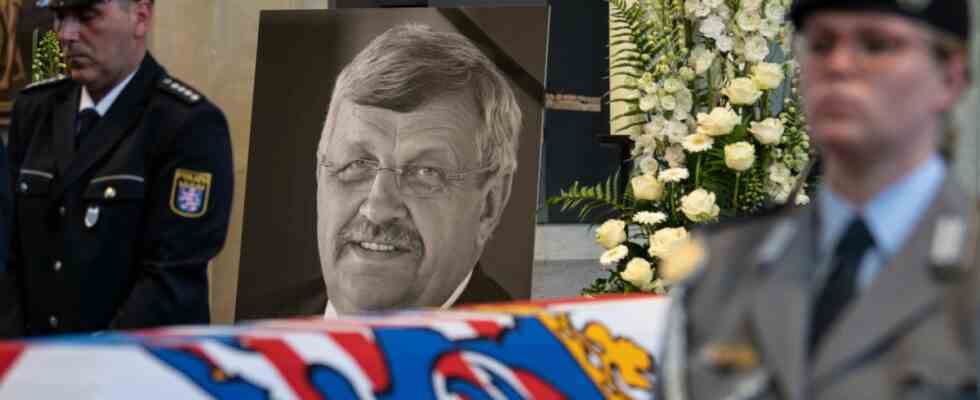Revision hearings before the Federal Court of Justice (BGH) are mostly exclusive events for lawyers, even the accused rarely appear there in person. It was a little different this Thursday. It is true that Stephan Ernst was not in the Karlsruhe courtroom when the 3rd Criminal Senate called for the hearing in the Walter Lübcke murder case. So the man who was sentenced to life imprisonment in January 2021 for the murder of the Kassel district president. But Irmgard Braun-Lübcke and her two sons were present. And the widow once again made it clear in moving words that the relatives are not only concerned with punishment. The judgment of the Frankfurt Higher Regional Court (OLG) still leaves a few gaps: “It is important for us that we learn the whole truth.”
Of course, the chairman of the criminal senate, Jürgen Schäfer, made it clear right at the beginning that the role of the BGH – although it is the highest criminal court – in investigating the truth is very limited. Hearing the witnesses and evaluating the evidence to find out what exactly happened on the evening of June 1, 2019 on the terrace in Wolfhagen-Istha where Lübcke was shot: all of this is a matter for the “trial court”, i.e. the OLG Frankfurt. “We have to accept the assessment of evidence even if a different assessment of evidence would be possible or even more obvious,” explained Schäfer. The BGH can only examine the judgment for errors of law.
During the trial there were no indications that Stephan Ernst’s conviction could contain such mistakes. He was found guilty of murder, the severity of his guilt was recognized and preventive detention was ordered. That means: Ernst, who is deeply rooted in xenophobia and Nazi ideology, will not leave prison after just 15 years. His defense attorney Mustafa Kaplan tried again to classify Ernst’s crime as manslaughter and not as murder, but the chances of that are slim.
The question of how the Federal Court of Justice dealt with the acquittal of the co-defendant Markus H., Ernst’s brother in spirit, might be more interesting. It was he who filmed Lübcke’s appearance at a town meeting in 2015 and posted excerpts of it online. The performance that sparked Ernst’s unbridled hatred simply because Lübcke had advocated treating refugees humanely there. Ernst had changed his statement several times, sometimes H. is said to have been at the scene of the crime, sometimes he is said to have even shot himself.
A verdict will be announced on August 25
The Federal Public Prosecutor’s Office and the lawyers for the relatives acting as joint plaintiffs see the OLG’s judgment as at least a starting point for “psychological assistance” by Markus H. For example, that he could have encouraged Ernst in his will to kill. Or that he even helped Ernst to improve his gun skills by doing target practice together. In the words of federal prosecutor Johann Schmid, the Higher Regional Court made “exaggerated and legally incorrect requirements for the formation of convictions”. In other words, the court set the hurdle for aid too high from its point of view.
Schmid based this on Ernst’s first statement to the police on June 25, 2019. There he said little to Markus H., which could possibly have been interpreted as a helper role, but the Higher Regional Court took this part of the statement with pointed fingers and wanted it not allow him to prove accessory to murder without additional circumstantial evidence. Schmid considers this strict standard to be excessive, especially since the court otherwise considered this statement to be credible.
Is that enough for a new process? Is it enough to close the gaps that Irmgard Braun-Lübcke complained about? It is true that the legal requirements for “mental assistance” are not particularly high. But it was not clear from the rather skeptical-sounding words of Senate Chairman Schäfer whether the Federal Court of Justice sees such a serious legal error that it is reopening this part of the process.
But another round in court could also be imminent for Stephan Ernst. He was acquitted of stabbing and seriously injuring a young Iraqi near a refugee camp in January 2016. A trace of DNA on one of the accused’s knives could have come from the victim – but the Higher Regional Court was not satisfied with this as evidence. Should Ernst still be sentenced for it, this would not change anything about the life imprisonment. But the truth about a right-wing violent criminal does. A verdict will be announced on August 25.

